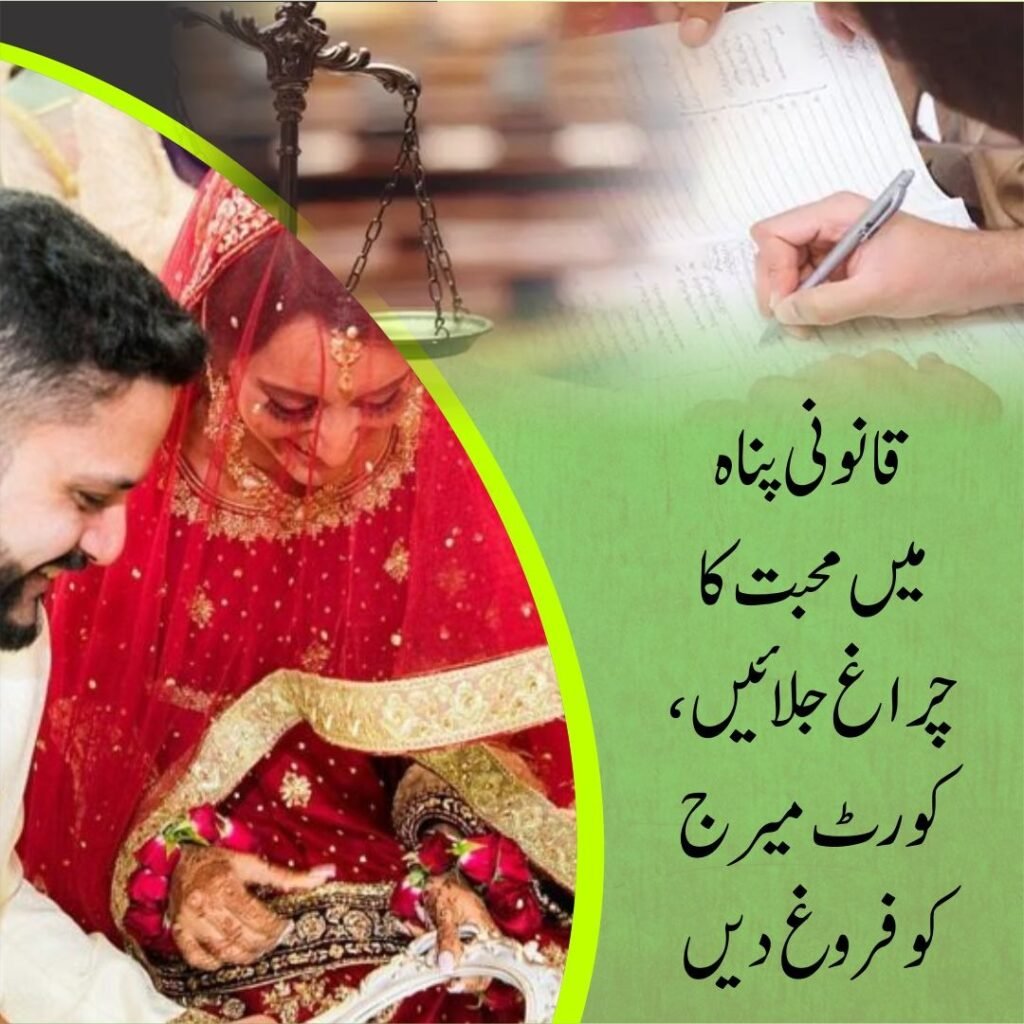- Date modified:
- 2022-01-04
Marriage Laws in Pakistan:
Court Marriage OR Courtship Marriage?
Court Marriage OR Courtship Marriage?
Court Marriages are Actually Courtship Marriages
Marriage Laws in Pakistan Exist but No Court Marriage Law: Court marriages are growing in Pakistan, day by day.
Court Marriages in Pakistan are Courtship Marriages or Love Marriages, in fact.
In Pakistan, marriage is not a social activity but it is a legal matter. Marriage can only be legally done by two individuals who are above the age of 18 years and not less than 16 years. In a country like Pakistan, where the majority of people are Muslims, religion plays a very important role in deciding the fate of an individual. In Islam, marriage is allowed before maturity but they cannot live together until both males and females attain maturity.
Marriage is a very simple and straightforward process in Pakistan.
Marriage is a very simple and straightforward process in Pakistan. Marriage is not just a religious ceremony, but also a civil contract between two parties. The marriage certificate is issued by the Nikah Registrar, officially deputed to register Nikah in a certain locality.
Marriage means entering into an agreement with each other where each party agrees to live together until death does them part or divorce occurs. The purpose of marriage is to create mutual love between husband and wife through their children; hence it should not be regarded as merely a contract between bride and groom alone without any consideration for the children they may have later on in their lives!
Court Marriage is neither illegal nor un-Islamic.
Courtship Marriage is neither illegal nor un-Islamic. It is a perfectly valid way of getting married and it has been the tradition of our country for centuries. There are many misconceptions about court marriage in Pakistan which is actually a love marriage after courtship and without the consent and approval of the parents of the bride and groom.
Courtship marriages have been practised in different countries since ancient times, including England and France. Court marriage law exists in India but no such law is exists in Pakistan because Pakistan’s constitution protects right to marry to every citizen,
The Pakistani legal system is composed of both English common law and Islamic law. English common law has a greater influence on commercial law, while Islamic law has a greater influence on personal status law, criminal law, and tax law.
In Pakistan, family law is a mix of British laws and Islamic preachings.
There are currently fifty-one (51) family laws in Pakistan, out of which thirty-seven (37) are federal and the rest are provincial. Sixtenn of Pakistan’s family laws deal specifically with matters relating to Muslim families, 3 with Christians, 11 with Hindus, and one (1) each with Sikhs and Parsis, while about nineteen (19) are general laws that apply to all Pakistanis. Below is the list of laws of Pakistan concerning family matters and marriage rules etc.
- The Divorce Act, 1869
- Guardians and Wards Act 1890
- Parsi Marriage and Divorce Act, 1936
- Dissolution of Muslim Marriages Act 1939
- Muslim Family Laws Ordinance, 1961
- Family Courts Act, 1964
- Dowry and Bridal Gifts (Restriction) Act 1976

Muslim Family Law Ordinance 1961:
A marriage is a union between a man and a woman as husband and wife with mutual consent. Marriage, or Nikkah according to Islamic law, is a legal contract that regulates a partner’s sexual relations with a partner. Under common law, marriage is regarded as a civil contract met by the following conditions:
- Marriage is a legal contract between two people, husband, and wife
- Mutual agreement or consent
- A contract drafted in the prescribed form
Registration of Marriage:
The provisions of the Ordinance mandate that all marriages performed under Muslim Law are registered. A marriage license will be granted by the Union Council to one or more Nikkah Registrars in accordance with this Ordinance. Under the Muslim Family Laws Ordinance, 1961, maintenance and dower are discussed, among other things.
Mahr:
The term Mahr refers to a mandatory payment to the bride, usually in cash, or in possessions, that is paid by the groom, or by his father, at the time of marriage, and that legally becomes her property.
Further sub-categories of specified dower include “prompt” and “deferred”.
Polygamy:
An act of polygamy involves the simultaneous marriage of two or more women. Muslim Family Law Ordinance requires a man to obtain the written permission of his wife in order to marry another woman. The polygamy act must be reported to the Arbitration Council in this case. In order to form a polygamous marriage, a husband must submit an application and pay a prescribed fee to the local union council.
Talaq:
’Talaq’’ or dissolution of marriage is the ending of a marriage by one of the spouses. The Talaq verbally made by a husband is construed as invalid, and he is not considered divorced if he did not send a written notice to the government office. A written notice must be sent to the chairman of the Union Council. A copy of the notice of talaq must then be given to the wife by the chairman. Noncompliance will result in imprisonment or a fine. Following the expiration of ninety days from the day on which the notice of repudiation was first delivered to the chairman, the talaq that was not explicitly or implicitly revoked in the meantime takes effect. When the wife is pregnant at the time of the talaq, the decree will not take effect for ninety days following the talaq.
Dissolution Of Muslim Marriages Act 1939:
A divorce law applies when a woman seeks a divorce from her husband. In this case, it is an act titled The Muslim Personal Law (Sharia) Application Act, 1937, which regulates marriage, succession, and inheritance among Muslims. Under Muslim law, a wife can seek divorce through extrajudicial or judicial means. Those who are extrajudicially convicted use Talaq-i-Tafweez. Muslim marriage can be dissolved using the Dissolution of Muslim Marriages Act 1939. According to the act, divorce grounds and divorce procedures exist.
Grounds for dissolution of marriage:
Any Muslim woman who has been married may obtain a decree dissolving her marriage for any of the following reasons:
- The husband’s whereabouts were unknown for a period of four years
- The husband has neglected the wife’s maintenance for two years
- The husband married another woman (polygamy) in contravention of the provisions of the Muslim Family Laws Ordinance, 1961
- In the case of seven years of imprisonment of the husband
- For a period of three years, the husband failed to fulfill his marital obligations
- When the couple married, the husband was impotent and continues to be impotent
- Insanity for two years or a serious venereal disease causing husband’s insanity
- If the wife was married by her guardian before the age of 16, after the age of puberty she can exercise the option of dissolving the marriage
- Any other valid reason can be the cause of the dissolution of marriage

